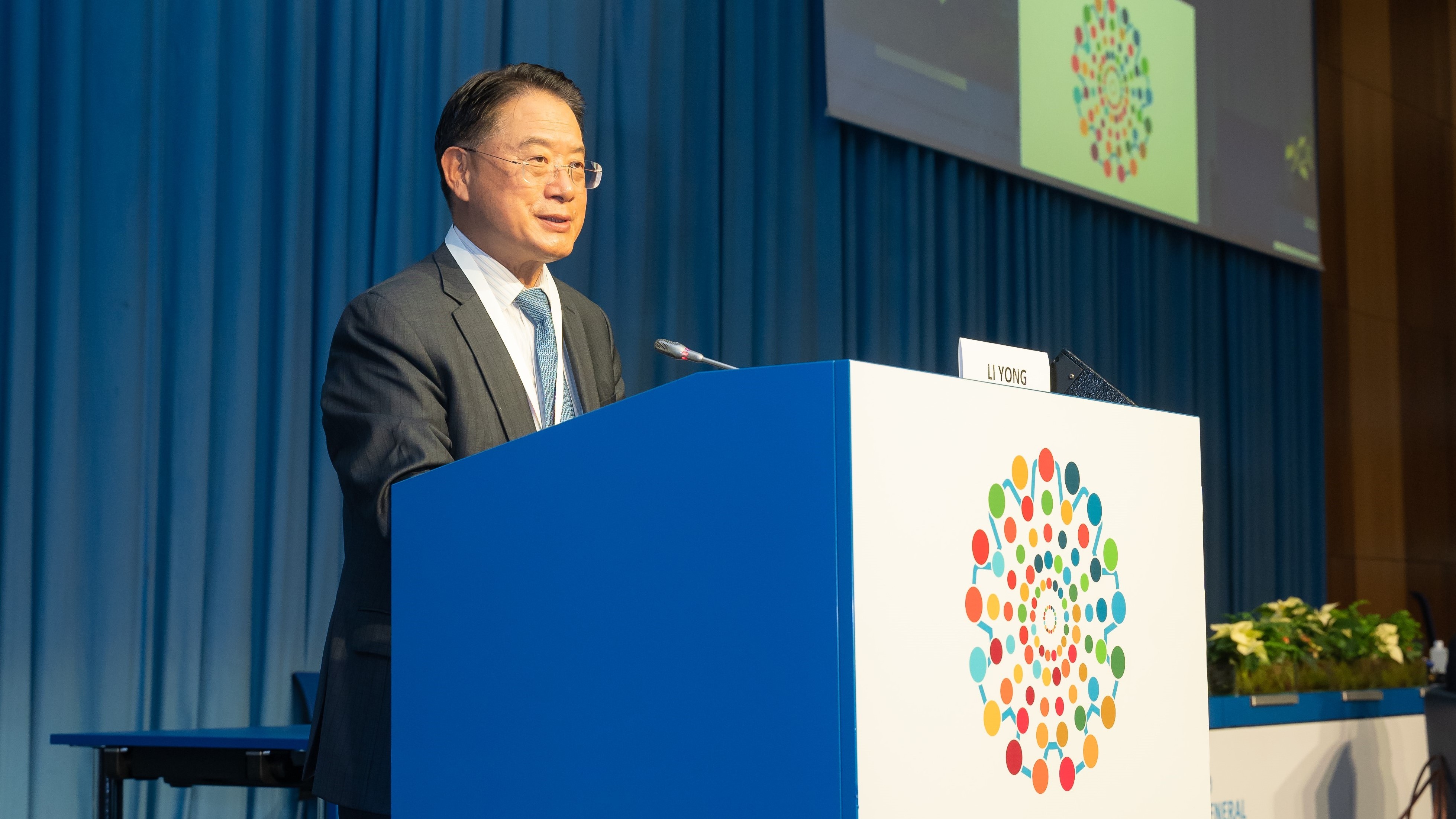Innovative partnerships key to scale up impact, build a better future for all
30 November 2021

VIENNA, 30 November 2021 – Representatives of donor governments and partner institutions of the United Nations Industrial Development Organization (UNIDO) at the Organization’s fifth Donor Meeting agreed that innovative partnerships and programmatic approaches can provide more flexibility, efficiency, transparency and accountability in delivering development impact.
Held within the framework of the nineteenth session of the General Conference of UNIDO and under the theme “Scaling up impact through innovative partnerships”, the meeting provided insight into how Member States and development partners work together with UNIDO to scale up impact and efficiency to achieve common development objectives, recover from the COVID-19 pandemic and build a more resilient future through inclusive and sustainable industrial development. With the participation of representatives of the European Union, Italy, Japan, Sweden and Switzerland, the event showcased various initiatives exemplifying UNIDO’s approach.
In his opening statement, UNIDO Director General LI Yong said, “Only through inclusive multilateralism that draws on the private sector, local and regional authorities, civil society and academia, as well as strong multilateral institutions, can we achieve sustainable and inclusive solutions to the current challenges,” adding, “The Organization works closely with Member States and funding partners to further its transition towards more programmatic, impact-driven approaches, to foster transformational change and deliver development impact towards the SDGs.”
Martin Saladin, Head of Operations at the Swiss State Secretariat for Economic Affairs (SECO) joined the event to discuss the Global Quality and Standards Programme (GQSP) and the Global Eco-Industrial Parks Programme (GEIPP), which form part of the Switzerland-funded portfolio at UNIDO and aim to achieve system change through tailored, country-specific interventions.
“Global programmes are innovative approaches, combining national efforts and adding value through a global knowledge management component,” Saladin said, adding that such initiatives allow for the creations of synergies for increased efficiency and effectiveness, and the sharing of best practices and experiences between countries for the benefit of all stakeholders.
In presenting a regional approach to project design, Jessica Magnusson, Senior Advisor at the Swedish International Development Cooperation Agency (Sida) presented Sweden’s partnership with UNIDO through the Energy efficient lighting and appliances project in Southern and Eastern Africa.
“The regional economic communities and their respective regional sustainable energy centres are very important as they have the mandate for advancing standard harmonization efforts,” said Magnusson with regard to Sida and UNIDO’s promotion of standard-setting, adding that this also benefits the private sector and supports market creation.
“UNIDO is an important partner in this through their global network of regional sustainable energy centres,” Magnusson emphasized.
The fifth Donor Meeting is available from 5:35:00 to 6:59:00.
Maintaining the regional perspective and focus on environmental protection, Stefano Dotto, Head of Sector for Climate Change, Energy, Environment and Transport at the European Commission, joined the event to discuss the SwitchMed programme. This regional flagship initiative of UNIDO, which is implemented in eight South Mediterranean countries, stimulates the creation of new, greater business opportunities and decent employment, while reducing the environmental footprint of economic activities in the region.
“Environment and climate change in the Mediterranean region requires that sustainable consumption and production become the norm so that we no longer make a difference between ‘economy’ and ‘sustainable economy’, and bring about a triple win: for the environment, for business and for consumers,” Dotto said.
With the second phase of SwitchMed, the European Union and UNIDO are working to help industries become more resource and energy-efficient, increase productivity, reduce pollution and provide access to international markets with good quality products.
Norio Maruyama, Ambassador of Japan to South Africa, provided insights on the country’s work with UNIDO to tackle another global environmental threat, that of marine plastic litter. This joint effort was highlighted through the presentation of a project to support the transition from conventional plastics to more environmentally sustainable alternatives in South Africa.
“This has been another successful example of cooperation between Japan and UNIDO in Africa and can enrich the regional and global discussion on circular economy,” Ambassador Maruyama said. “Together, we can promote the results and lessons learned from this project and provide inspiration to many to advance innovative solutions to protect our environment.”
The meeting further explored the advantages of partnering with the private sector, presenting a joint initiative between UNIDO, the Italian Agency for Development Cooperation and Illycaffè to improve the inclusive and sustainable development of the coffee value chain in Mozambique.
“We joined with UNIDO because of their capacity to link with the private sector. We particularly recognize the valuable technical support from Illy in this project,” said Alberto Giani, Team Leader for Agriculture, Food Security and Rural Development at the Italian Agency for Development Cooperation’s office in Maputo, Mozambique.
In concluding the event, Hiroshi Kuniyoshi, Deputy to the Director General of UNIDO, expressed confidence that the discussion “has provided inspiration for us to work more closely together through innovative resource mobilization approaches that can deliver transformational change and accelerate progress towards the achievement of the Sustainable Development Goals”.
Find out more about the fifth Donor Meeting here.
For further information, please contact:
Strategic Relations and Resource Mobilization Division